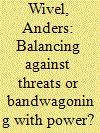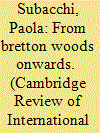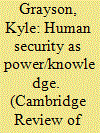| Srl | Item |
| 1 |
ID:
083055


|
|
|
|
|
| Publication |
2008.
|
| Summary/Abstract |
The United States has played an important role in European security since the early 20th century. From the time of the end of the Cold War, this role has changed as a consequence of the lack of a common territorial threat and the overwhelming power of the United States relative to Europe. How have European states responded to the challenges of the American world order? Are they adapting their security policies to match the challenges of US security policy and the American world order? What are the implications of the European response for the transatlantic relationship? This article seeks to describe and explain European security behaviour in the American world through the prism of two realist theories: balance of power realism and balance of threat realism. Despite sharing a common starting point in realist assumptions, each theory allows us to tell a different story about Europe's position in the American world order as well as the opportunities and challenges it faces
|
|
|
|
|
|
|
|
|
|
|
|
|
|
|
|
| 2 |
ID:
083056


|
|
|
|
|
| Publication |
2008.
|
| Summary/Abstract |
This article looks at the evolution of European small states' military policies after the Cold War. Traditionally, small states faced a security dilemma between favouring influence and guaranteeing sovereignty. These security options were embodied by the strategy of alliance and the policy of neutrality. This article argues that in today's unipolar world small states' security policy must be cooperative either in the form of joining a security institution or an ad hoc coalition. This has two consequences for small states' military policies. These can either favour niche or lead/framework nation strategies. This in turn, depends on the strategic ambitions of the small states, which are ultimately mediated by their strategic culture. This article concludes by looking at the military policies of Cold War neutral states after the Cold War
|
|
|
|
|
|
|
|
|
|
|
|
|
|
|
|
| 3 |
ID:
083058


|
|
|
|
|
| Publication |
2008.
|
| Summary/Abstract |
Will the dollar soon lose its key international currency status? In this article I argue that neither the emergence of the Euro nor geopolitical issues threaten the future of the dollar. The world's central banks may slow down their accumulation of dollars, but are unlikely to put an end to the dollar standard regime. I also caution against confusing the international role of the dollar as the supreme store of value with its two other roles-as the dominant international unit of account and medium of exchange. These latter two functions do not change abruptly, meaning, once again, that there is no immediate threat to the future of the dollar. The article also discusses similarities between today's dollar standard and the Bretton Woods regime, and conclude that the complexity of today's system is such that it cannot just be defined as a repetition of the Bretton Woods system, or 'Bretton Woods 2'.
|
|
|
|
|
|
|
|
|
|
|
|
|
|
|
|
| 4 |
ID:
083060


|
|
|
|
|
| Publication |
2008.
|
| Summary/Abstract |
This article interrogates the parameters of the human security debate as a site of biopolitics in order to gain an understanding of how it has been possible to shape the debate in certain ways and not others. The role of cosmological realism in grounding knowledge claims within the debate is explored. By privileging objectivist claims to knowledge of human (in)security, it is argued that empiricism and rationalism, as forms of cosmological realism, foster the production of logics which facilitate forms of biopolitical intervention. The quest for precision, measurement, causality and policy relevance that define the production of human security knowledge is shown to have important political effects beyond the definitional debate itself in terms of agency, normalcy, and the scope for intervention. Therefore, this article demonstrates how the demarcation of human security as a field of knowledge is a process pregnant with relations of power that are important to understanding contemporary political dynamics
|
|
|
|
|
|
|
|
|
|
|
|
|
|
|
|
| 5 |
ID:
083059


|
|
|
|
|
| Publication |
2008.
|
| Summary/Abstract |
consider a small but growing corner of the global justice literature: conceptions of human rights advanced under republican lights. I outline three recent republican justificatory arguments for principles of global justice embodied in human rights: Stuart White's appeal to the republican emphasis on civic virtue, and the appeals to a republican conception of liberty advanced by Philip Pettit and James Bohman. I argue that in all three accounts, too little attention is paid to constraints on the reasons that can be offered to a diverse domain of agents. I sketch an outline of the criteria plausible justificatory reasons must contain. In the appeal to virtue, no such reasons are forthcoming. In the appeal to liberty, such reasons may be forthcoming if republicans give up the claim that human rights are justified by appeal to 'liberty' itself. I conclude that a suitably modified appeal to the republican conception of liberty may be plausible.
|
|
|
|
|
|
|
|
|
|
|
|
|
|
|
|
| 6 |
ID:
083061


|
|
|
|
|
| Publication |
2008.
|
| Summary/Abstract |
This article discusses the role of the private company in the fight against terrorism. It argues that the private company has become politically important to counterterrorism efforts, but the economic logic guiding the risk thinking of private companies is hardly compatible with the aim of providing national security. By examining whether and in what manner the risk of terrorism is considered a corporate responsibility, the article seeks to answer whether and how the political role ascribed to the company finds any resonance in the risk practice of private companies. The article approaches this question by examining how Danish food and infrastructural companies conceptualize the relationship between terrorism risks and corporate responsibility. It demonstrates that a distinction between safety and security discursively facilitates an exclusion of national security concerns from the concept of Corporate Social Responsibility (CSR) and thereby works to deresponsibilitize the company in the fight against terrorism.
|
|
|
|
|
|
|
|
|
|
|
|
|
|
|
|
| 7 |
ID:
083057


|
|
|
|
|
| Publication |
2008.
|
| Summary/Abstract |
This article claims that the European Union (EU) has had a very peculiar relationship with the globalized post-Cold War economic order. On the one hand, the EU was instrumental in bringing about this order. It aggressively promoted (both internally and externally) the principles and policies upon which this economic order has been based. On the other hand, this proactive engagement was translated within the EU into a highly polarized and antagonistic public discourse that led to a serious identity crisis. In this way, it is argued that economic globalization emerged in the EU as a debate on the nature and future of Europe. After 2005, this polarized and antagonistic discourse started to change. The rise of flexicurity, as a new way of thinking about Europe's place and orientation in the global political economy, has been instrumental in this shift. The article examines and evaluates these developments and their implications for the European project.
|
|
|
|
|
|
|
|
|
|
|
|
|
|
|
|